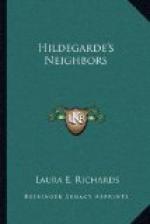“Oh, Hildegarde!” cried Bell, “what does it mean?”
Gertrude was in tears by this time, the big crystal drops rolling silently down her cheeks; her heart was wrung, she did not know why.
“Hester Aytoun,” said Hildegarde, softly. “This must have been her playroom, Bell. She used to live here; it is about her that I wanted to tell you. But first let us see what she has written here. I think she would be willing; we are girls, too, and I don’t think Hester would mind.”
There were tears in Hildegarde’s voice, if not in her eyes, as she read the writing, now yellow with age:
“I, Hester Aytoun, being now sixteen years old, am putting away my dear dolls, the dearest dolls in the world. Sister Barbara says I am far too old for such childish things; but I shall never be too old in my heart, though I may well busy myself with household matters, especially if I must marry Tom in three years, as he says. So I put away my dear dolls, and I shall shut up the playroom, also, for I could not think to pass by it each day and not go in to see them, and that Sister Barbara will not allow. It may be that no one will find my playroom till I show it myself to my little children, if God wills that I have them, which I shall pray always, now that I may not have my dolls any more. But if that should not be, or I should be taken away, then I think no harm to pray that a girl like myself may one day find my playroom that father made for me,—my own room, where I have been a very happy child. A man would never know what it meant, but a girl would know, and if it should so hap, I pray her to be gentle with the bedstead, for one leg is weakly; and if she will leave my dear dolls, when she has well played with them, I shall bless her always for a gentle maiden, wherever I be. So farewell, says “Hester Aytoun.”
All three girls were crying by this time, and little Gertrude laid her head on her sister’s shoulder and sobbed aloud. Bell smoothed her hair with light, motherly touches, drying her own eyes the while. Hildegarde sat silent for a while, the letter in her hand; then she folded it again, and gently, reverently laid it again in the doll’s hand.
“Dear Hester!” she said, “we do know, dear; we do understand, indeed.”
And then, sitting on the floor by the pretty bedstead, and speaking softly and tenderly, she told the two girls of that other maiden who had lived and died in this old house,—the bright, beautiful Hester Aytoun, who faded in her springtime loveliness, and died at eighteen years; who had left everywhere the traces of her presence, soft, fragrant, like the smell of the flowers in her own garden.
“I chose my bedroom, that you like,” said Hildegarde, “because I felt sure, somehow, that it had been hers. I never had a sister, girls, but Hester seems to me like my sister; and sometimes”—she hesitated, and her voice fell still lower—“sometimes I have felt as if she wished it to be so,—as if she liked to come now and then and see the old home, and give a loving look and word to the things she used to care for so much. I am glad we found this place, but I don’t think I shall tell anyone else about it, except mamma, of course, and Jack, when he comes home.”




